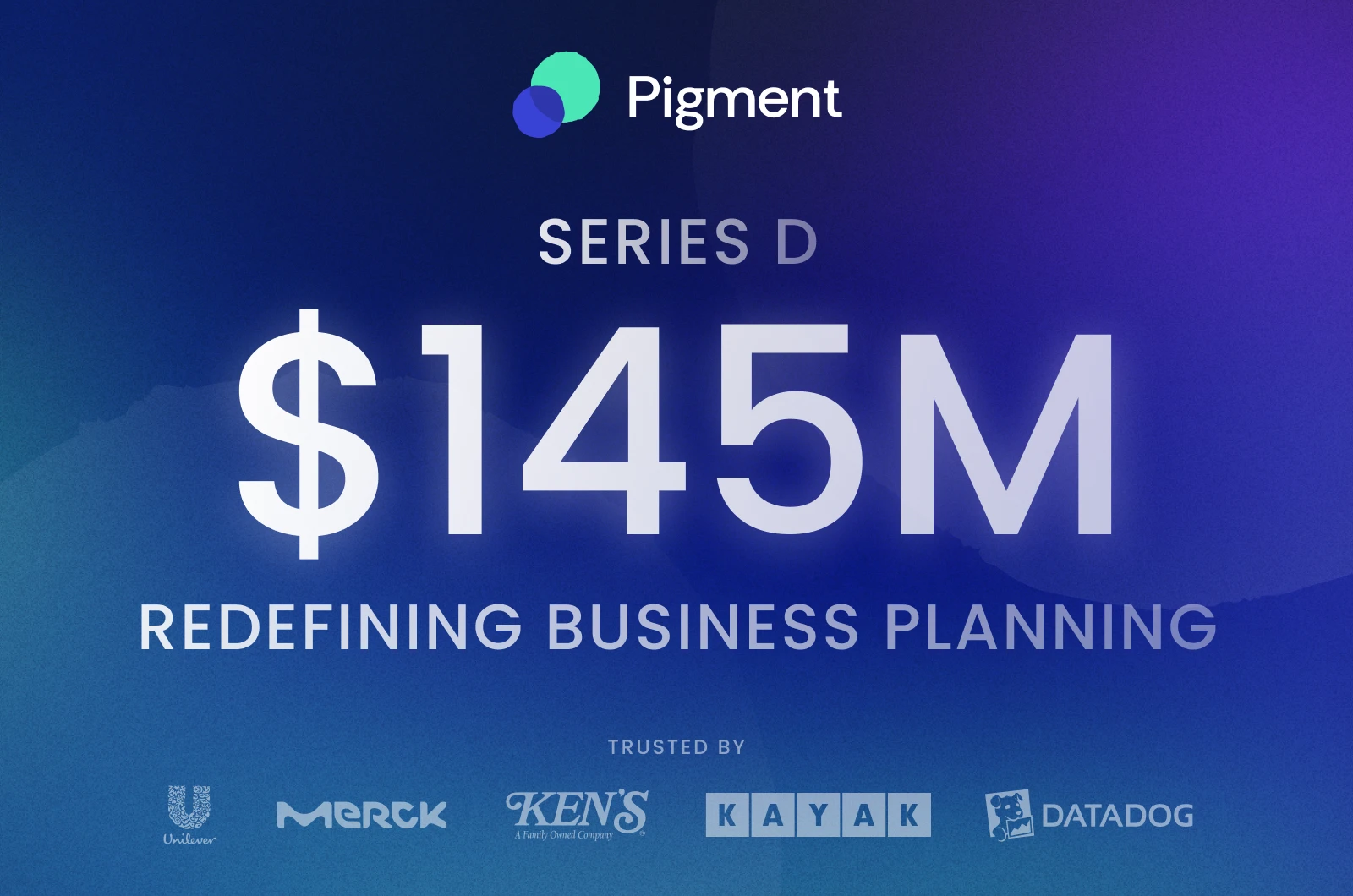Before getting started, let’s acknowledge that 2022 was hard.
It’s the end of a long year. You’re feeling a roller-coaster of emotions from tired to excited to just plain worried for the future.
But despite the uncertainty; the recession, inflation, and market downturns, you’re still here.
Pigment’s mission was always special to us, but now more than ever, we feel duty-bound to help people like you envision a better future. We can’t change what has already happened, but we can take charge of the factors under our control going into the new year.
We’re a business planning platform and that can seem numbers oriented, but we actually see a glimpse of humanity behind those numbers. And the signals are encouraging.
Take a break.
Laugh with us as we count down the biggest trends we saw that left us feeling hopeful and should fill you up with hope, too.
#10: A slow economy is the best time to invest in yourself
In today's economic climate, it's easy to feel like you're just treading water. But instead of seeing a slowdown as a negative, what if you took this opportunity to invest in yourself?
Whether it's taking a course to learn new skills or finally tackling that side project you've been meaning to get to, using this time to focus on personal growth can pay off in the long run.
And since there are less demands on your time and money, you may find that you have more headspace to devote to these pursuits. So instead of bemoaning a slow economy, use it as an opportunity to invest in yourself.
You may be surprised at how rewarding it can be. Here are a few ideas to get you started:
Take that course you’ve been procrastinating on: Seasoned expert or beginner, we can all benefit from learning something new. Why not take this time to finally learn SQL, or refresh your financial reporting fundamentals?
Keep up with industry buzz: Another way to develop your finance career during an economic downturn is to stay current on industry news. For example, do you know why continuous planning is the future of FP&A? By staying up-to-date on what’s going on in the industry, you’ll be better equipped to make decisions that will help your career during tough times.
Network, network, network: Community is key — that’s the biggest lesson many of us learned during the isolation of the pandemic. Not only does networking open up career opportunities, you also find a new perspective on challenges that would otherwise take much longer to solve by yourself.
#9: Recessions fuel creativity
If you travel back in time to the Great Recession of 2008 or back further to the Great Depression, you’ll see that they were also periods of great innovation.
Sliced bread was first introduced in 1930 during the Great Depression. In more recent times, companies innovated on technology or even strategy:
- Amazon launched AWS, Prime, and Kindle, bringing profits rocketing up from the 2008 dip
- Lego forged strategic partnerships and expanded their global reach
- Airbnb was born, introducing easy, short-term stays to people unable to afford hotels in a recession

Many people believe that recessions are terrible for innovation and creativity. After all, when people are worried about losing their jobs or struggling to make ends meet, they're not likely to take risks or invest in new ideas.
But when people are facing tough economic times, they're often forced to think outside the box and come up with new ways to save or make money.
So next time you're feeling down about a recession, remember that it could actually be the perfect time to get your creative juices flowing.
#8: We’re making friends with the machines
If you work in finance, it's likely that you've seen automation come out as an important trend.
From data processing to running complex models, there are now ways to do it all with tech - and this is good news for you and others on your team.
Why? Because it reduces human error and rework, and allows you to scale your work a lot faster. You can also focus on sharing deeper insights with decision makers instead of wasting time on manual tasks.
Just look at some of the incredible ways automation saves time for finance teams:
- Save up to 80% more time on data processing with automatic data imports
- Always access real-time data with scheduled imports
- Easily rebuild financial models with drag-and-drop, metrics-based architecture

So if you're looking to stay ahead of the curve in finance, automating your workflows is a great place to start.
#7: Markets reward the best projects in a downturn
Market downturns mean heightened due diligence and more cautious spending. It’s a natural outcome of aversion to risk in an already precarious economy.
But that doesn't mean raising funds, finding your exit event, or entering a new niche is impossible — just harder. And the upside is, if your company has the right mix of
- product-market fit
- short time to value
- clear path to profitability
you’ll shine through the noise to attract funding, if doing so falls under your objectives as an organization and finance leader.
At Pigment, we raised our $65M Series B extension during the market downturn. Our Head of Finance, Chloé Giraut, shared the green flags investors look for when investing in a downturn. In summary:
- Prepare for increased investor scrutiny with a bank of data-backed answers to FAQs
- Maintain leverage through a cash rich position, customer advocacy, and highly skilled founders
- Share why you believe — and why it’s important for investors to believe — in your company’s mission and strategic execution
#6: Finance teams lead the culture of wise spending
You’re likely familiar with this cash burn rule of thumb:
“Work towards every dollar of spend generating 2X or 3X returns”
Maybe you’re in accounting, focusing on maintaining the records, or perhaps a more forward-looking role like FP&A. Regardless, the finance department as a whole pays a key role in imbibing the culture of wise spending throughout the company.
In 2023, you have the opportunity as a team to guide the company towards best practices that extend the cash runway.

With budgets tightening and discretionary spending coming under scrutiny, it is essential for businesses to be careful with every dollar they spend. Your team can provide guidance and oversight on spending decisions.
You can help identify areas where money can be saved, and ensure that all expenditures are necessary and will provide value for the company. By being prudent and mindful of costs, you can set an example that others will follow.
#5: You’ll learn the true meaning of “data-driven”
At this point in time, people have figured out that the keyword “data” automatically adds authenticity to claims, reports, and decisions.
But what does it actually look like to be a data-driven team? Can you say with confidence that, for example, you helped your CEO set clear month-to-month objectives to best utilize funding to further the company’s objectives through the recession?
Data-driven finance teams use data to inform decisions, to track progress, and to improve performance. As a team you should always be looking for new ways to collect data and new ways to use it to your advantage.
You’re constantly experimenting, collecting data, and analyzing it. And you empower decision-makers to take risks based on data-backed analysis — in turn positioning yourself as an indispensable part of strategic growth.
#4: You don’t need a crystal ball to predict the future with accuracy
If you’ve been following Pigment for a while, you know how scenario planning is the most exciting methodology emerging in FP&A.
Whether it’s evaluating if your company needs a hiring freeze, or charting the course of product development to secure long-term growth, scenarios let you visualize outcomes across best case, worst case, and baseline scenarios.
Why does that matter?
You now have a smart way to feed past and current data into a planning model that envisions everything that could go right and wrong. And when you’re facing market downturns, that’s powerful information to have.

#3: FP&A hiring is set to steadily increase in 2023 and beyond
FP&A jobs are on the rise, and the demand for forward-looking finance professionals is growing.
The FP&A field is expected to grow by 11% by 2026, with over 30k jobs available. This growth is driven by the need to safeguard against an uncertain economy in organizations, as well as the increasing complexity of financial planning and analysis.
FP&A jobs are highly sought-after, and competition is fierce. However, with the right skills and experience, you can land your dream FP&A career or successfully climb the ladder.
Pro tip: our Co-CEO Eleonore Crespo and Head of Finance Chloe Giraut send out top FP&A jobs every week to a growing community of 1k+ FP&A professionals. Subscribe here.
#2: We might narrowly avoid a recession
Okay look, there’s no doubt that recession is most people’s number-one feat at the moment. But it’s important to stay objective and look at the numbers:
Overall, if you take a pessimistic approach, the economy is slated to shrink by 0.4%, while more optimistic outlooks suggest a 2.9% global GDP growth.

The thing is, no one really knows what will happen.
We might avoid a recession next year, but will still face a slower economy. The recession may not be as severe as initially feared, but it will still have a significant impact on the economy.
Consumer spending will decrease, businesses will close their doors, and unemployment will rise. However, there are ways to protect yourself from the worst of the recession.
By being careful with your money and staying resilient, you can weather the storm and come out ahead. Moreover, you can take pride in the fact that your company looks to finance professionals like you to navigate tough times.
It is helpful to stay alert in an uncertain economy, but fear isn’t the means to finding answers. Here’s an apt summary of the situation finance professionals are facing:
“I'm tired of people spreading fear amongst the Finance population. The world is not going to end, we've faced much worse. We are support functions, and we’re here to support the company’s needs. If priorities shift, we just execute to make sure the business adapts as quickly as possible to the new normal.” - Chloé Giraut, Head of Finance at Pigment
#1: You are not alone
No, this is not like those times out-of-touch celebrities sang “Imagine” from their mansions and assured us that “we’re all in this together”.

Finance teams are shifting gears from number-cruncher mode to strategic finance business partnership. Businesses are increasingly partnering with one another to gain a competitive edge, and teams are aligning themselves more closely to achieve common goals.
All of this shows that the closer we work together, the further we can go. Of course, collaboration isn't always easy.
It can be challenging to get everyone on the same page, and there may be disagreements along the way. But if we can learn to work together effectively, the rewards will be well worth it.
Seriously, 2023 is the year of cross-functional collaboration. The faster you catch on, the quicker you demonstrate your impact and value to the business.
Why not partner with your data science team for better data governance and best practices? Or help Sales with building realistic forecasts?
Closer to home, take a look at bridging the gap between FP&A and Accounting.
It’s very reassuring to know you’re not going into a shaky economy alone — but the onus is on you to acknowledge and make the shift. So let's put our heads together and see what we can achieve!
Best wishes for a very happy holiday season from all of us at Pigment!
.svg)

.svg)




.webp)

.webp)
.jpeg)

.jpg)